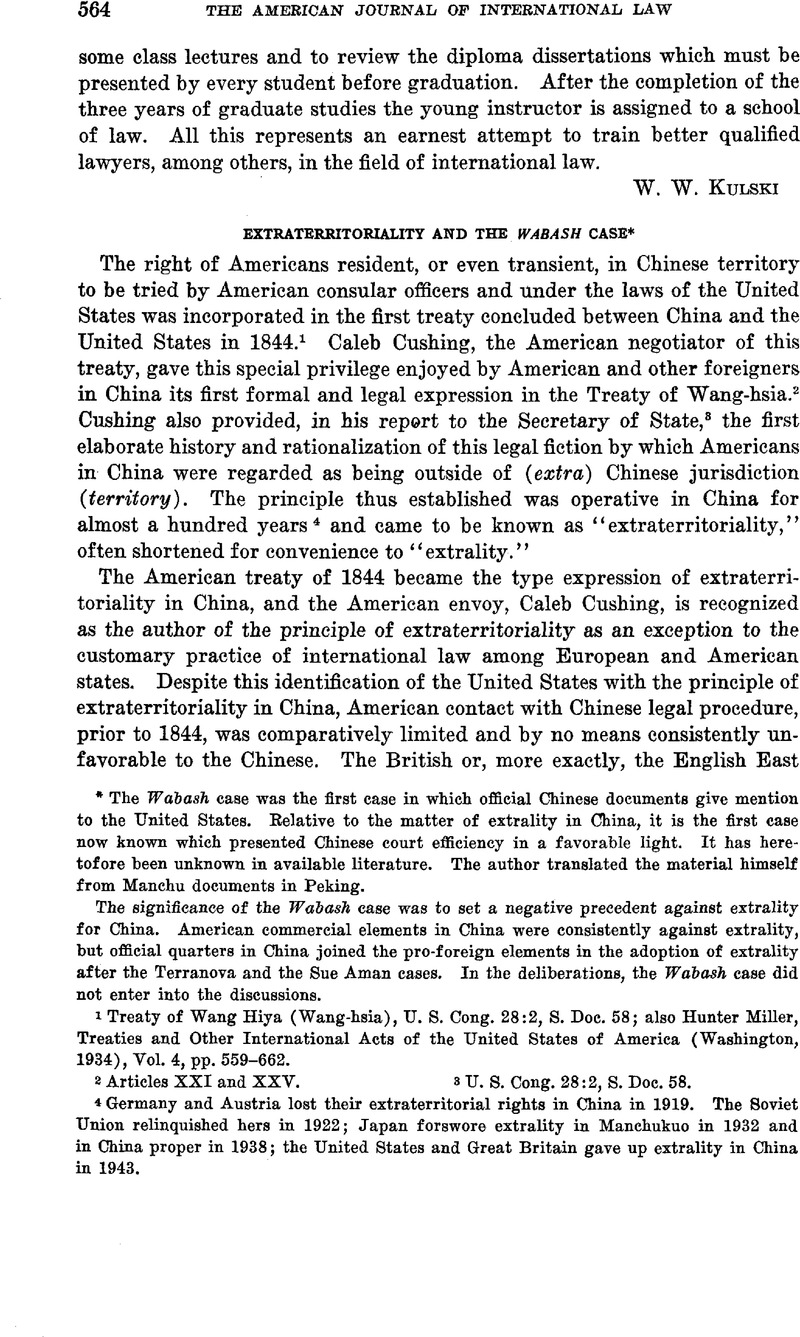No CrossRef data available.
Article contents
Extraterritoriality and the Wabash Case*
Published online by Cambridge University Press: 20 April 2017
Abstract

- Type
- Current Notes
- Information
- Copyright
- Copyright © American Society of International Law 1951
Footnotes
The Wabash case was the first case in which official Chinese documents give mention to the United States. Relative to the matter of extrality in China, it is the first case now known which presented Chinese court efficiency in a favorable light. Ihas heretofore been unknown in available literature. The author translated the material himself from Manchu documents in Peking.
The significance of the Wabash case was to set a negative precedent against extrality for China. American commercial elements in China were consistently against extrality, but official quarters in China joined the pro-foreign elements in the adoption of extrality after the Terranova and the Sue Aman cases. In the deliberations, the Wabash case did not enter into the discussions.
References
1 Treaty of Wang Hiya (Wang-hsia), U. S. Cong. 28:2, S. Doc. 58; also Hunter Miller, Treaties and Other International Acts of the United States of America (Washington, 1934), Vol. 4, pp. 559-662.
2 Articles XXI and XXV.
3 U. S. Cong. 28:2, S. Doc. 58.
4 Germany and Austria lost their extraterritorial rights in China in 1919. The Soviet Union relinquished hers in 1922; Japan forswore extrality in Manchukuo in 1932 and in China proper in 1938; the United States and Great Britain gave up extrality in China in 1943.
5 Morse cites sixteen cases in which foreigners were charged with killing Chinese and seven cases of Chinese assault against foreigners. Of these only one case, Terranova, is American. The Wabash case is not mentioned, and the Sue Aman case, which occurred in 1844, was, of course, beyond the terminal dates of his comment. International Relations of the Chinese Empire (London, 1910), Vol. I, pp. 100-109.
6 The basic U. 8. documents on the Terranova case are found in XJ. S. Cong. 26:2, H. Ex. Doc. 71; the Chinese account of the case is found in a memorial of Juan Yuan, Nov. 8, 1821, in Ch’ing-tai Wai-chiao Shih-liao (Peking, 1932), Tao-Tcuang series, Ch. 1, pp. 7b-9b.
7 “Trade and Intercourse with China,” The Quarterly Beview (London), Vol. 42 (1830), pp. 165-167; E. Everett, “Execution of an Italian at Canton,” North American Review, Vol. 40 (1835), pp. 58-68.
8 U. S. Cong. 28:2, S. Docs. 58 and 67.
9 Ch’ing-tai Wai-chiao Shih-liao (State Papers of the Manchu Dynasty), 10 pen (Peiping, 1932).
10 Cf. Tyler Dennett, Americans in Eastern Asia (New York, 1912), pp. 120-121; Niles Weekly Register (Dee. 20, 1817), Vol. 13, p. 266.
11 Wilcocks to Adams, Sept. 22, 1817, U. S. Cong. 26:2, H. Ex. Doc. 71, p. 7.
12 Ibid., loc. cit.
13 Ibid., loc. cit.
14 Translation by the Beverend Robert Morrison, ibid., p. 9. The proclamation is dated June 6, 1817.
15 Cited by Dennett, op. cit., p. 120.
16 National Register, 1818; Nilea Weekly Register (Feb. 21, 1818), Vol. 13, p. 431; ibid. (Jan. 6, 1821), Vol. 19, p. 308.
17 Ch’ing-tai Wai-chiao Shih-liao, Chia-ch’ing series, Ch. 6, pp. 43a-45b.
18 Ch’ing-shih Lieh-chuan, Ch. 34, pp. 16b-25b; mentioned in Hummel, Eminent Chinese of the Ch’ing Period, Vol. 2, p. 716.
19 The other groups were occupational: criminals, barbers, and actors.
20 Couling, Encyclopaedia Sinica, p. 544.
21 Ch’ing-tai Wai-chiao SMh-liao, loc. cit.
22 A British version definitely establishes the fact that the pirates spoke English, and supplies other details of interest: “…a Chinese Compradore's Boat went alongside [the Wabash} about 9 o'clock in the evening, and some of the Crew asserting in English that they were the Bearers of a Letter from the Captain (who had proceeded to Canton) they were permitted to come on board, when they suddenly attacked and quickly overpowered the Americans on deck; and having secured the rest of the Ship's Company, they plundered the vessel of valuable property and departed with their Booty, steering towards the Ladrone Islands. An officer and two seamen severely wounded in this attack were landed this morning and sent to the Portuguese Hospital.” Quoted by H. B. Morse, The East India Company, Vol. III, p. 318.
23 Ch'ing-tai Wai-chiao Shih-liao, loc. cit.
24 Ibid.
25 Ch'ing-tai Wai-chiao Shih-liao, Chia-ch'ing series, Ch. 6, pp. 45b-46a.
26 The Imperial endorsement is dated Aug. 10, 1817, indicating a twenty-two-day interval between the dispatch of the memorial from Canton and its consideration at the Court in Peking.
27 Ch'ing-tai Wai-chiao Shih-liao, Chia-eh'ing series, Ch. 6, pp. 47a-47b.
28 Cf. Niles Weekly Begister (1818), Vol. 14, p. 309; (1822), Vol. 21, p. 405; Vol. 22, pp. 354-356, etc.


